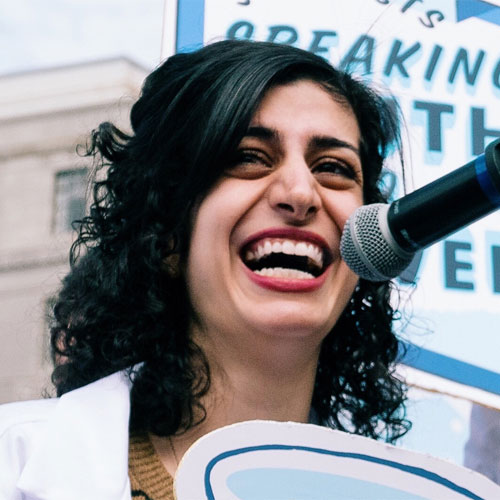Maryam Zaringhalam is a molecular biologist and AAAS Science and Technology Policy Fellow. She received her Ph.D. from The Rockefeller University where she tinkered with parasites and computers to understand how small changes to our genetic building blocks can affect how we look and function. She serves on the leadership board of 500 Women Scientist — a grassroots, women-founded, and women-run science advocacy organization — and is a producer for the Story Collider. She also co-hosts the science policy podcast Science Soapbox, and her writing has appeared in Slate, Scientific American, and Quartz.
At the start of her graduate career, Dr. Maryam Zaringhalam was gifted with a book called Ignorance: How it Drives Science by the neuroscientist Stuart Firestein. At the close, she received its companion, called Failure: Why Science Is So Successful. The two books shaped her training as a molecular biologist at The Rockefeller University. Any scientific question worth pursuing begins with ignorance, pushing the boundaries of the unknown. And, like any bold endeavor, science is subject to frequent failure.
These two features of the scientific process – ignorance and failure – are often cited by science skeptics to question consensus and mount cases for defunding science. Zaringhalam’s awareness of this tension grew over the course of her graduate career as she increasingly engaged in the intersection between science and society.
Rockefeller’s motto is “Science for the benefit of humanity.” Zaringhalam took that to heart. She came into her Ph.D. program believing science not communicated is science not done. To accept public support for research requires cultivating an active dialogue with the public at large – not passively handing down knowledge, but making the public equal and engaged stakeholders in what science has to offer. So she made science communication an integral part of her graduate training.
Zaringhalam launched a public event series and blog called ArtLab, pairing scientists with artists to drive a conversation around the scientific process drawing on the creative practice – the prodding in the dark, the failures, and the boundary-breaking epiphanies. But she found through the series that she was only able to preach to an already science-interested choir. She wasn’t reaching communities who were mistrustful of science or were frustrated with its pace or viewed scientists as an interest group. It wasn’t enough to simply communicate science, she had to actively advocate for the importance of its practice and products. So she began to look for outlets that might begin to shift people’s hearts and minds and weave science into public life.
To draw from the experiences of those working at the intersection of science and society, Zaringhalam joined two of her fellow graduate students, Avital Percher and Devon Collins, in creating a podcast called Science Soapbox. The podcast was an incredible opportunity to meet those who think deeply about how science can and should serve humanity. Together, they’ve interviewed thinkers from President Obama’s Science Adviser Dr. John Holdren to California Congresswoman Jackie Speier. Their conversations drove home the role of community organizing, policymaking, and advocacy in building relationships between those practicing science and those who should benefit from that science.
Zaringhalam found these conversations were happening as more scientists were waking up to the importance of bringing science back to the people. The decline of government support for research coupled with the increase in anti-science rhetoric has been a major catalyst for Zaringhalam and scientists of her generation. They understand scientists can no longer afford to isolate themselves from the societal context of their work. She also found herself face to face with the darker products of science – from the threat of nuclear war to allusions to genetic supremacy.
Zaringhalam’s science communication priorities moved in turn. She began communicating less about scientific discoveries and more about science as it is practiced and applied. She sees everything from the ignorance and failure that drives progress to the less savory chapters in the history of science as opportunities to build public trust and understanding.
In the aftermath of the 2016 election, Zaringhalam found her community in the emergent grassroots organization 500 Women Scientists. She joined the leadership team, inspired by their commitment to empowering women in STEM fields to build equity into science advocacy, activism, and evidence-based policymaking. While scientists may not be able to change the culture of an entire nation overnight, they can recommit to the work of equity, inclusion, and ethics within their own institutions.
A newly minted Ph.D., Zaringhalam has moved away from the bench to step into the world of science policy, while committed to remaining a public-facing scientist. Her breadth of experiences has led her to Washington, D.C. as an AAAS Science and Technology Fellow dedicated to understanding how science should inform policymaking and as a producer for the Story Collider committed to bringing true, personal stories about science to the public. Science taught her that the best way to approach a challenge was from all angles possible with patience and persistence. She continues to carry that ethos with her through her advocacy journey.
